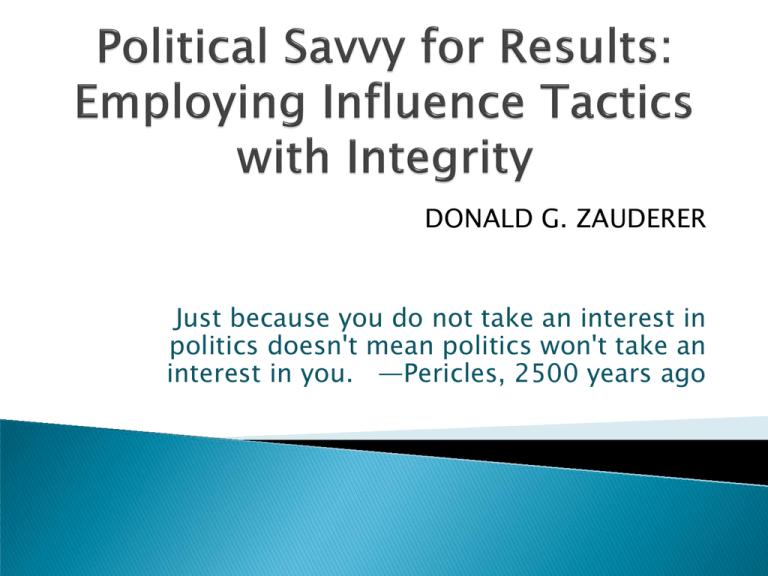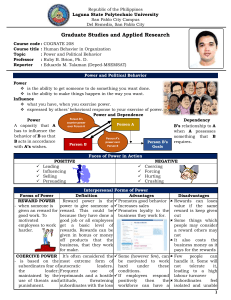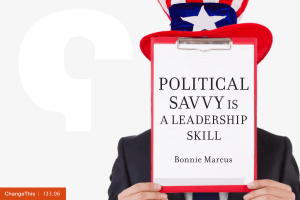Just because you do not take an interest in
advertisement

DONALD G. ZAUDERER Just because you do not take an interest in politics doesn't mean politics won't take an interest in you. —Pericles, 2500 years ago How to promote career and organizational success by employing influence tactics in a competitive culture 2 Politics is the exercise of influence, often informal, unofficial, and behind the scenes, to achieve important organizational goals while also enhancing career success. In most organizations, people are simultaneously competing and collaborating with each other. New opinions are always suspected, and usually opposed, without any other reason but because they are not already common.” John Locke “The Art of the political consists of directing rationally the irrationalities of men” Reinhold Neibuhr 3 The impulse toward: Seeking status Self interest Self deception Aggression Envy Bernard Madoff 4 Managers live in two worlds simultaneously. One is a web of responsibilities, commitments, and ethical aspirations. The other world is an arena of intense sometimes brutal competition. Success is embracing the paradox. 5 Assumptions Inferences Reprogramming “The mightiest warrior is he who can conquer himself” Confucious 6 Power pockets: who is aligned with who Informal influencers Emerging leaders Formal and informal structure 7 Discover the buzz about you Modify behaviors that reinforce the negative buzz Tell stories that reinforce your new identity If you know somebody is going to complain, get there first Conduct a brown bag seminar on a highly important innovation 8 Promote Yourself With Integrity Forward testimonials and congratulatory notes Serve on committees and organization task forces Deliver an executive briefing Share credit with others Write “thank you” notes Quick pitch Brandon and Seldman 9 Insurance for bad times Heads up warning when sabotage hits Endorsements for initiatives Big picture understanding Influence perceptions about you Sense of inclusion is enhanced Others think of you when opportunities arise 10 Law of reciprocity Influence bosses, peers, and subordinates Interview superiors Learning from peers and subordinates 11 You should cultivate relationships with: Like-minded colleagues Powerful seniors Unofficial influencers Emerging leaders People on whom you are dependent Issue(s) specific coalition 12 Obedience is a reflex Personal accountability Focus on risks and consequences Ira Chaleff 13 George Burns 14 Bibliography Peter Block, The Empowered Manager, 1987 Rick Brandon & Marty Seldman, Survival of the Savvy, 2004 Ira Chaleff, Intelligent Disobedience, 2015 Pamela Cuming, The Power Handbook, 1981 Joel R. Deluca, Political Savvy, 1999 Kathleen Kelley Reardon, It’s All Politics: Winning in a World Where Hard Work and Talent Aren’t Enough, 2005 John P. Kotter, Power and Influence: Beyond Formal Authority, 1985 John P. Kotter, Power in Management, 1979 Gareth Morgan, Images of Organization, 1986 Anthony Robbins, Unlimited Power: The Way to Peak Personal Achievement, 1986 Sun Tzu, The Art of War for Managers: 50 Strategic Rules, 500BC, 2001 Douglas Yates, Jr. The Politics of Management, 1985 15 16







